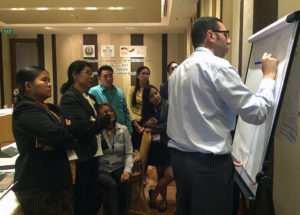Photo above: The participants of the ASEAN Preparatory Meeting for BSTA46 of the UNFCCC at Eastin Grand Sathorn, Bangkok, Thailand (28 February 2017) /Photo by Soojin Kim (FAO)
By: Jonas Dallinger
BANGKOK, Thailand – Delegates from Member States of the Association of Southeast Asian Nations (ASEAN) agree, agriculture deserves special attention in the processes of the United Nations Framework Convention on Climate Change (UNFCCC). In a meeting in Bangkok, they underlined their continued support for an ASEAN common position on issues related to agriculture in UNFCCC processes. This Common Position has been developed in 2016 and was fed into the Position of the G77 and China group at the 22nd session of the Conference of Parties (COP22) in Marrakesh, Morocco.
“The G77 and China negotiation position in COP22 wouldn’t have been possible without the ASEAN Common Position on Agriculture,” explained Mr. Sherif Dawoud from the Ministry of Foreign Affairs of Egypt who acts as the coordinator for agriculture for G77 and China. After more than five years of discussion under the agenda of the Subsidiary Body for Scientific and Technological Advice (SBSTA), a decision on the future of the sector under the UNFCCC was expected for the 45th session of SBSTA during COP22. However, disagreement between parties from developed countries and the countries of G77 and China prevented the submission of a text for a COP decision. The issue has been postponed to May 2017, at the 46th SBSTA session which can be considered a “make-or-break” moment for agriculture under the UNFCCC.
To strategize about how to prepare for the 46th SBSTA session in Bonn, Thailand hosted this special ASEAN Climate Resilience Network meeting on 28th of February, with support from the ASEAN-German Programme on Climate Change (GAPCC) of GIZ. “The Agriculture Sector plays a unique role in addressing climate change and its impacts. How this role is fulfilled deserves special attention. As the sector is of crucial importance for our economies and millions of farming communities, we as ASEAN Member State need to speak in one voice to ensure that SBSTA makes progress on agriculture,” pointed out Dr. Margaret Yoovatana from the Thai Department of Agriculture which is chairing the ASEAN Climate Resilience Network. Beau Damen, Natural Resources Officer at the United Nations Food and Agriculture Organization (FAO), reminded participants of the significant knowledge gaps that exist on climate change adaptation and mitigation, especially in tropical agriculture. He also highlighted the need for technical support to realize agriculture’s potential contribution to combating climate change and its impacts.

The meeting posed a great opportunity to discuss in detail the commonalities and differences in the position of the G77 and China Group and the Group of Developed Countries. Delegates also discussed what they learned from their involvement in SBSTA45 at COP22, what is their common goal for the sector under UNFCCC, and what to achieve at SBSTA46. Delegates agreed: SBSTA work on the sector needs to continue to address the many open questions on agriculture and climate change and to strongly promote support for the sector. They also confirmed that Thailand should continue its leading role in coordinating the issue.
The ASEAN Climate Resilience Network (ASEAN-CRN) is a platform for regional exchange on climate smart agriculture (CSA). The ASEAN-CRN is established to ensure that ASEAN member states (AMS) are in a better position to adapt their agricultural sector to climate change and optimize its mitigation potential. The ASEAN-CRN is supported by the German Federal Ministry for Economic Cooperation and Development (BMZ) through the ASEAN-German Programme on Response to Climate Change in Agriculture and Forestry (GAP-CC). GAP-CC is implemented by the Deutsche Gesellschaft für Internationale Zusammenarbeit (GIZ) GmbH in close cooperation with the ASEAN Secretariat (ASEC).